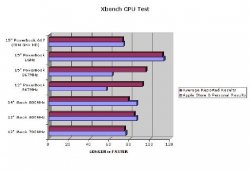I believe you mean the less pipeline stages you have the harder it is to clock. (either that or you're just dead wrong, having less parallel pipes certainly does make things simpler, and generally more clockable)Originally posted by nuckinfutz
I don't believe this is true. The less pipes you have the harder it is to clock.
In any case, longer pipes are a tradeoff for higher clock speeds, but they aren't the only way, or the best way to achieve those speeds.
Originally posted by nuckinfutz
Apple is not the only company that uses G3's. There was a market for a lowcost chip like the G3 at higher mhz. It never materialized. I doubt Apple caused this..that's giving them too much credit.
Apple is the only company that uses G3s in significant enough quantity to drive production to new tech, ans no, there wasn't such a market. Who would buy a high clocked G3 in any significant quantity? Not Apple, Moto and IBM have their own reasons not to be interested in such a thing, the embedded market has nowhere near the performance pressure the desktop market has (and where performance is a problem they're generally better suited by SIMD or DSPs). That leaves... what? Upgrade makers and non-mac PPC computers? Do you realize how low volume they are?
Being able to match G4 prices isn't exactly an accomplishment worthy of note, Moto hasn't been doing much better there than anywhere else.Originally posted by nuckinfutz
The PPC 970 is only %14 larger than a 180nm G4. IBM's fabs should be better than Moto's and the not needing the L3 cache could make the 970 systems basically the same price as the G4. G3's are going to be cheaper of course so I agree with that. IBM moves to 300mm wafers soon and provided yields are good Apple could use 970s amongst a majority of their lineup. Things get even easier when 90nm chips roll out.
And, unfortunately increasing transistor density also drives up error density, die size is not the only factor (although it is the major one). In any case, low end processors will continue to evolve along with the high end. G3s will be manufactures in smaller CDs too.
Originally posted by nuckinfutz
This makes no sense. They may be the "only" advantages but those are some pretty big additions. If the Market deems those functions as relevant then the fact that the G3 doesn't have them doesn't bode well for it's use.
But these aren't the kinds of features one looks for in a bargain basement and/or mobile processor. Most of those features would see little or no use in the kinds of systems Apple is likely to continue using G3s in anyway.
Originally posted by nuckinfutz
What's the point of technobabble? One only needs to get on OSX running on and iBook versus Powerbook or encode MPEG2 for iDVD to see the the G3 cannot keep up with the G4. We can generate "What ifs" all night long but fact is the G4 feels perceptably faster to the average user IMO.
Sure, you can generate Altivec-heavy cases where the G4 will be niticablly faster, but there are plenty of other cases where it isn't. And even your chosen cases will probably favor the upcoming G3/w Altivec that the article mentioned.


